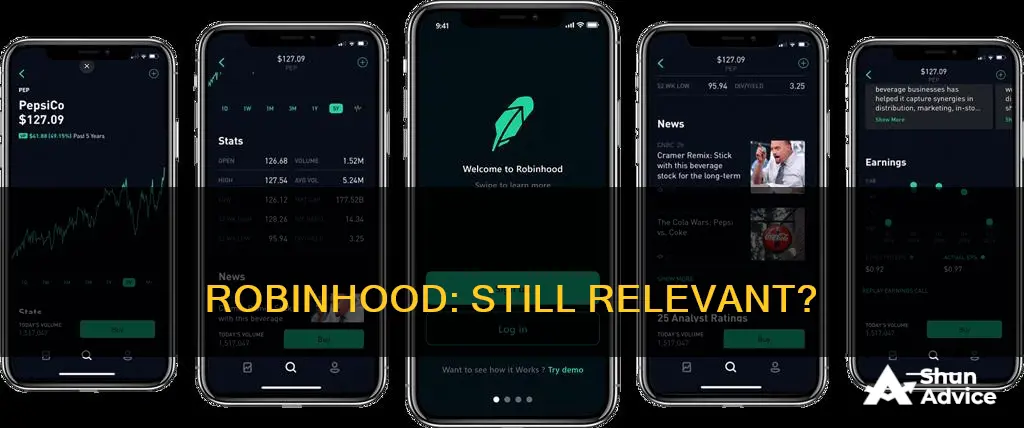
Robinhood is a commission-free stock trading app that has gained popularity since its launch in 2015. The app has over 10 million active users and is best suited for beginner investors who want a solid place to invest on the go.
Robinhood has a simple interface that is easy to use and navigate. It offers a range of investment options, including stocks, exchange-traded funds (ETFs), options, and cryptocurrencies. The app also provides users with access to Initial Public Offerings (IPOs) and allows for fractional share trading.
However, Robinhood has faced criticism and regulatory issues for its controversial payment for order flow practices, outages during busy trading periods, and limited customer support. Some users have also reported issues with withdrawing their funds from the app.
Despite these drawbacks, Robinhood remains a popular choice for those looking for a straightforward and self-managed investment experience.
What You'll Learn

Is Robinhood safe and secure?
Robinhood has had a turbulent few years, with a series of controversies and customer complaints. However, the platform does have security measures in place to protect its users' accounts and data.
Firstly, Robinhood uses two-factor authentication to protect accounts. This means that signing in or making changes to an account requires two sources of verification: something the user knows, such as their password, and something they have, such as a one-time verification code. This helps to ensure that even if someone knows a user's password, they cannot access their account without the second form of verification.
Robinhood also uses industry-standard measures to protect users' personal information and data. For example, account passwords are hashed using the BCrypt hashing algorithm and are never stored in plaintext. Sensitive information, such as Social Security numbers, is encrypted before storage. Additionally, the Robinhood app and website use the Transport Layer Security (TLS) protocol to ensure secure communication with their servers.
Robinhood also offers guidance on how users can protect themselves, such as enabling passcodes and biometric login on their devices and not opening suspicious links or downloading software.
In terms of financial protection, Robinhood Financial LLC and Robinhood Securities, LLC are members of the Securities Investor Protection Corporation (SIPC). The SIPC protects securities for customers of its members up to $500,000, including $250,000 for claims for cash, for each investing account, including IRAs. Robinhood has also purchased additional insurance to supplement SIPC protection, which provides protection for securities and cash up to an aggregate of $1 billion.
However, it is important to note that this additional insurance does not protect against a loss in the market value of securities, and crypto positions through Robinhood Crypto are not protected by the SIPC.
Robinhood has also been the subject of security incidents and lawsuits. In November 2021, there was a data security incident that revealed personal information for a portion of account holders, although the company stated that no customers experienced financial loss. Robinhood has also been fined by the Financial Industry Regulatory Authority (FINRA) and the Securities and Exchange Commission (SEC) for misleading customers and providing false or misleading information.
While Robinhood has faced criticism and legal issues, it does have security measures and policies in place to protect its users' accounts, data, and finances. However, users should also be aware of the risks and make an informed decision about whether they feel comfortable using the platform.
Investments: Your Future's Best Friend
You may want to see also

What are the pros and cons of Robinhood?
Pros
- No minimum investment requirement: There is no minimum amount of money required to open a Robinhood account and start investing.
- Commission-free trading: Robinhood offers commission-free trading of stocks, ETFs, options, and cryptocurrencies.
- User-friendly interface: Robinhood has a streamlined interface that is easy to use, especially for beginner investors.
- Cryptocurrency trading: Robinhood allows users to trade cryptocurrencies for free, which is a feature that is not commonly offered by other stock brokerages.
- High interest on uninvested cash: Robinhood offers a relatively high interest rate on uninvested cash, with 1.5% for free accounts and 5% for Gold accounts.
- Fractional shares: Robinhood offers fractional shares, allowing investors to buy partial shares of expensive stocks with a small amount of money.
- Instant funds availability: Robinhood provides instant access to funds after trades, which is convenient for users who want to quickly reinvest their profits.
- Intuitive mobile app: Robinhood's mobile app is highly rated for its ease of use, sleek design, and customizability.
- IRA with contribution match: Robinhood offers individual retirement accounts (IRAs) with a 1% match on contributions, which is a unique feature among non-employer-sponsored retirement accounts.
- IPO access: Robinhood provides users with the opportunity to participate in initial public offerings (IPOs), which is typically reserved for financial institutions.
Cons
- Limited investment selection: Robinhood has a limited range of investment options compared to other platforms, such as a lack of mutual funds and bonds, which makes it difficult to build a diversified portfolio.
- Lack of trading tools and resources: Robinhood does not provide advanced trading tools and features that are available on other platforms, which may be important for more experienced traders.
- Poor customer support: Robinhood has been criticized for its inadequate customer support, with users reporting difficulties in reaching the support team and resolving issues.
- Outages and trade restrictions: Robinhood has experienced frequent outages and trade restrictions during periods of high market volatility, which has disrupted users' ability to trade.
- Controversial practices: Robinhood has been involved in several controversies, including allegations of "gamification" tactics to encourage risky trades, misleading customers, and restricting trades during the GameStop stock surge.
- Security concerns: Robinhood has had data security incidents in the past, raising concerns about the safety of users' personal and financial information.
Investments: The Drive to Gain More
You may want to see also

How does Robinhood make money?
Robinhood is a commission-free trading app that generates revenue through a process called payment for order flow. When a person trades on the app, Robinhood sends that trade to a larger entity, which is able to leverage thousands of orders at once for a slight advantage. The larger entity then compensates Robinhood for the orders. This process has received some criticism, especially after Robinhood halted trades of GameStop and BlackBerry during the ‘meme stock’ mania. Payment-for-order-flow is also controversial as it incentivises Robinhood to find the highest bidder, not the leader who will execute the trade fastest. Robinhood generates around 70 percent of its revenue from this practice.
Robinhood also makes money by investing users' cash deposits at a higher interest rate, margin lending, stock lending, and its Gold subscription suite of services. The company also launched its first credit card in 2024, which will also bring in revenue.
The company generates the other 30 percent of its income from account interest and Robinhood Gold, which lets users trade on margin, make larger deposits and access professional reports from Morningstar. Robinhood Gold subscribers pay a monthly or annual fee for the service.
Robinhood also makes money through its Robinhood Connect service, which allows users to purchase and transfer crypto directly to self-custody wallets and dapps. Fees may apply depending on how users fund Robinhood Connect transactions.
Robinhood earns smaller revenues from proxy service revenue and fees listed in the Robinhood Financial's Fee Schedule.
Wealthy Secrets: Where the Rich Invest
You may want to see also

What are the alternatives to Robinhood?
Alternatives to Robinhood
Robinhood is a brokerage firm that offers commission-free stock, crypto, and ETF trades. The company was founded in 2013 by Stanford Graduate School of Business classmates Vlad Tenev and Baiju Bhatt. It is backed by well-known investors like Google Ventures and Andreessen Horowitz. Robinhood's primary purpose is to make investing more accessible by providing an online service that allows investors to invest in the stock market without the need for minimum account balances or high transaction fees.
However, Robinhood has faced scrutiny over its influence on meme stocks. Investors bought meme stocks based on hype, and many people believe that this has led to more than a million users opening brokerage accounts with just a $0 balance requirement, making them susceptible to bad investments and scams.
- Interactive Brokers: International broker providing all asset classes.
- EToro: Global social trading broker.
- Fidelity: US stockbroker.
- Zacks Trade: US discount broker.
- Charles Schwab: US discount broker.
- SoFi Invest: US discount broker.
- Webull: US discount broker.
- Alpaca Trading: US API broker.
- Vanguard: US stockbroker.
- Merrill Edge: US discount broker.
- M1 Finance: Cost-free investment service and a strong competitor of Robinhood. With the M1 Finance investment app, you can get both traditional investment services and receive professional investment guidance.
- Public: Stock and ETF trading app founded in 2017. This app uses a third party, Apex Clearing, to handle the background administrative stuff of running public user accounts. Public allows you to purchase a fractional share.
- TD Ameritrade: One of the best replacements for Robinhood, and the platform is easy to navigate and works perfectly on both the app and desktop/laptop computers. This brokerage firm does stock research and offers numerous investment opportunities.
- Acorns: A micro-investing platform that’s gained quite a bit of steam over the past few years. This Robinhood competitor uses the hands-off approach to investing. Therefore, you don’t have to spend time researching, building, and rebalancing your portfolio.
- E-Trade: A highly advanced trading platform. It enables you to trade stocks, ETFs, options, and mutual funds. You’ll have the ability to do extensive investment research if you want to or use an ETF screener to find a match for your investment needs.
- Stash: One of the best for beginners because you’ll get the investment app, banking options, as well as a debit card. So, everything is included in a single app, making managing your finances a breeze.
- Betterment: One of the best Robo-advisor apps for anyone who doesn’t want to pick their stock but would rather have their portfolio managed by professionals. It is one of the best alternatives to Robinhood that also offers a checking and savings account.
Investor Numbers: Who's in the Game?
You may want to see also

What are Robinhood's controversies?
Robinhood has been involved in several controversies since its launch in 2015. One of the most notable controversies is its role in the GameStop short squeeze in January 2021. Robinhood restricted the trading of GameStop and other heavily shorted stocks, which led to widespread criticism and accusations of market manipulation and collusion with market maker Citadel Securities. The company faced legal action and protests as a result of this decision.
Another controversy surrounding Robinhood is its practice of payment for order flow, which has been criticised as a "backdoor commission". This practice involves Robinhood receiving compensation from larger entities for sending trades to them, and it has been argued that this incentivises Robinhood to prioritise finding the highest bidder rather than the entity that will execute the trade fastest. Robinhood has also been criticised for undisclosed markups on cryptocurrency transactions.
In addition, Robinhood has faced security breaches and system outages that have impacted users' ability to access their accounts and trade. In 2020, the company suffered a systemwide, all-day outage during a period of high trading volumes, and in 2021, nearly 2,000 Robinhood accounts were compromised by hackers.
The company has also been criticised for its use of gamification tactics and for aggressively targeting inexperienced investors. In 2024, Robinhood agreed to pay a $7.5 million fine over charges from Massachusetts securities regulators, who argued that the company used confetti, emojis and other features to encourage riskier trades and strategies.
Furthermore, Robinhood has been accused of providing false or misleading information to customers and has been fined by the Financial Industry Regulatory Authority (FINRA) for failing to ensure that its customers received the best price for orders. The company has also faced lawsuits and regulatory action over these issues.
Overall, Robinhood's controversies centre around its business practices, security breaches, system outages, and the impact of its platform on inexperienced investors.
Frequently asked questions
Robinhood is a commission-free platform that remains one of the few stock brokers that also supports crypto trading. It is best for beginner investors and active traders. The pros of using Robinhood are:
- No recurring fees on basic accounts and no commissions on trades
- Supports fractional shares
- Earn free stock for signing up
- Designed for active and mobile trading
- Beginner-friendly investment tools
The cons of using Robinhood are:
- A monthly subscription is required for all features
- Controversial payment for order flow practices
- History of outages during busy trading periods
- You can't trade mutual funds or bonds
Robinhood is a safe stock broker that's regulated by the Securities and Exchange Commission (SEC) and follows the same regulatory requirements as other popular brokers. It's also a member of the Financial Industry Regulatory Authority (FINRA) and the Securities Investor Protection Corporation (SIPC). Robinhood has also purchased additional insurance through Lloyds of London to supplement its current SIPC protection limits.
Robinhood makes money through a process called payment for order flow. Essentially, when a person trades on the app, Robinhood sends that trade to a larger entity, which is able to leverage thousands of orders at once for a slight advantage. The larger entity then compensates Robinhood for the orders.







